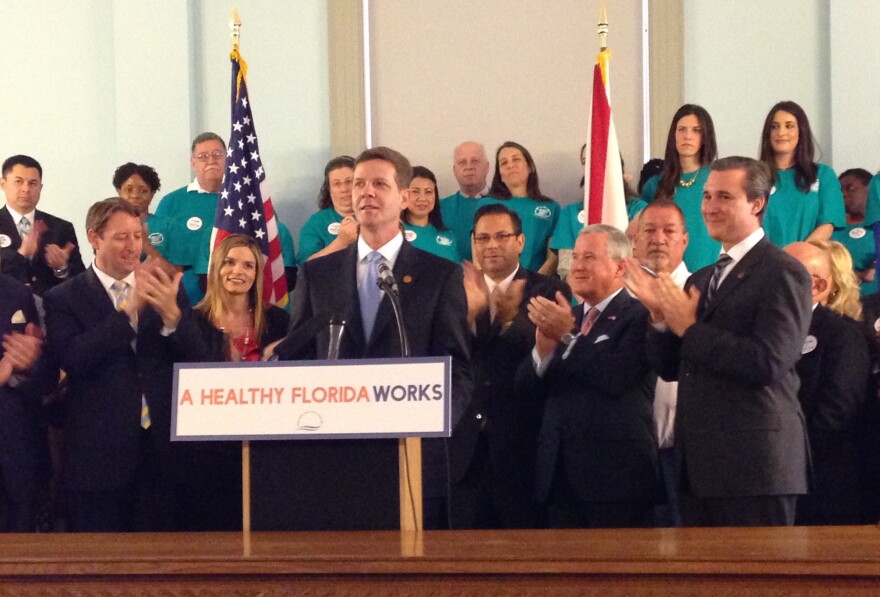As the fog surrounding healthcare in Florida thickens, some observers say there’s a way out of the storm…if lawmakers can ever make it there. Here's a look at some of the possibilities for a resolution to the legislature’s healthcare funding impasse.
--
The tension at the Capital amped up dramatically when Governor Rick Scott announced plans to sue the federal government over healthcare funding. U.S. Health Officials say a decision on whether to extend a critical hospital funding source may hinge on whether the state decides to expand Medicaid. Scott says linking the two-separate programs, amounts to coercion. Still, Georgetown University Medicaid expert Joan Alker says there may be a way for Florida lawmakers to escape the darkness.
“It would be a transitional period for the low-income pool that would accompany a path toward accepting the federal Medicaid dollars," she says citing part of a recent letter written by the federal government to the state. "The federal Medicaid dollars are greater for the state than the Low-Income pool, and it seemed to me the federal government was saying you can have both-at least for a transition period-as you move to a new system of coverage. And that seemed to me to be quite a nice offer to the state, and one they should seriously consider.”
Another possibility is that the legislature reaches a deal on Low-Income Pool funding. The $2 billion program reimburses hospitals for uncompensated care, and is jointly funded by the state and federal government. There are safety-net hospitals in particular that could be financially devastated by the loss of LIP funds—Jackson Memorial in Miami, Shands in Jacksonville, and All Children’s Hospital in St. Petersburg. Agency for Healthcare Administration Secretary Liz Dudek confirmed the safety-nets could be in trouble if LIP goes away and there’s nothing to replace it.
“With respects to medical schools, about half their funding. With respect to the four free standing children’s hospitals? About $125 million," she said, explaining potential financial losses to key hospitals.
Those areas also have large numbers of House Representatives. And the idea goes, if the House chooses to accept the Senate’s LIP funding plan—which the state has submitted to Washington in a formal request for an extension of the funds—there could be some sort of deal done to get a state budget out. The House is opposed to Medicaid expansion, and has struck LIP funding from its budget, since it’s unclear whether the program will be renewed.
Also in play is the possibility the federal government will de-couple LIP from Medicaid expansion, since the latter issue has become so contentious. Republican Senator Garrett Richter was part of a two-person team that recently went to Washington to advocate on the state’s behalf. He addressed that question to Dudek:
Richter: “Threin lies a big source of the solution. Whether they’re separated and whether they’re linked. And I think if you had more flexibility on that, I think it would make your negotiations easier, would you are with that? Dudek: If we were given more flexibility and if they would speak with us more, I think those are good things.”
And that leads to the fourth scenario. A desire to get a budget in place, the Senate could drop its stance on Medicaid expansion—something that would devastate supporters. But it would bring about a quicker resolution on the budget, which is the one bill lawmakers must pass.
“I don’t want to speculate on any particular outcome but I will tell you we’ve been consistent in maintaining an open mind about a whole range of options that respect all the concerns that have been expressed by the Speaker the President and the Governor holistically," Senate Appropriations Chairman Tom Lee told reporters after Dudek's confirmation hearing. "And if someone has an epiphany and there’s an opportunity to discuss what that might look like, we’re happy to do it, but so far there have been crickets.”
Lee was responding to a question on whether the senate was considering dropping its Medicaid expansion plan, nicknamed “FHIX”. Senator Richter, speaking to reporters, says that isn’t the case.
“I don’t see the Senate changing its position through this hearing whatsoever. I think the Senate posed questions to the Secretary and got answers, he said. When a reporter asked what happens when lawmakers get to the end of the regularly scheduled legislative session and there's still no deal, Richter replied, "I think there’s a desire t craft a responsible budget on time and get it out of here, it we have to stay late or come back, I think it’s more important to do it right.”
It’s all hypothetical. And no one is really certain about what’s happening behind the scenes. But lawmakers will eventually have to come back to the table. A balanced budget is required by the Florida constitution.





